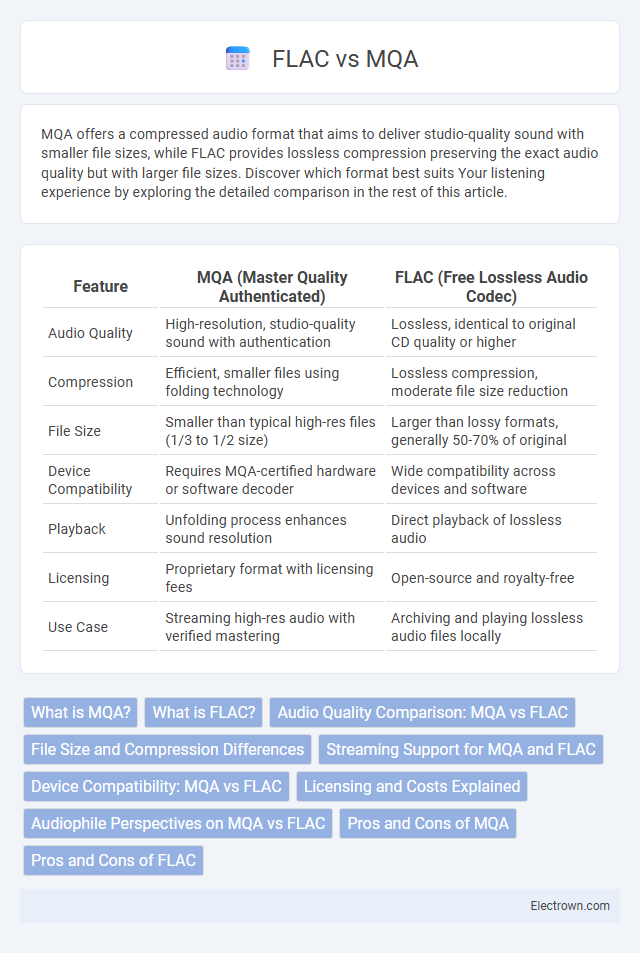MQA offers a compressed audio format that aims to deliver studio-quality sound with smaller file sizes, while FLAC provides lossless compression preserving the exact audio quality but with larger file sizes. Discover which format best suits Your listening experience by exploring the detailed comparison in the rest of this article.
Table of Comparison
| Feature | MQA (Master Quality Authenticated) | FLAC (Free Lossless Audio Codec) |
|---|---|---|
| Audio Quality | High-resolution, studio-quality sound with authentication | Lossless, identical to original CD quality or higher |
| Compression | Efficient, smaller files using folding technology | Lossless compression, moderate file size reduction |
| File Size | Smaller than typical high-res files (1/3 to 1/2 size) | Larger than lossy formats, generally 50-70% of original |
| Device Compatibility | Requires MQA-certified hardware or software decoder | Wide compatibility across devices and software |
| Playback | Unfolding process enhances sound resolution | Direct playback of lossless audio |
| Licensing | Proprietary format with licensing fees | Open-source and royalty-free |
| Use Case | Streaming high-res audio with verified mastering | Archiving and playing lossless audio files locally |
What is MQA?
MQA (Master Quality Authenticated) is an advanced audio codec designed to deliver high-resolution sound by capturing and preserving the original master recording's details while reducing file size for streaming. It uses a unique folding technology to encapsulate high-frequency audio information beyond standard CD quality, enabling efficient playback on both MQA-compatible and regular devices. Compared to FLAC (Free Lossless Audio Codec), which offers lossless compression without altering the original audio data, MQA emphasizes a balance between audio fidelity and streaming convenience.
What is FLAC?
FLAC (Free Lossless Audio Codec) is a popular audio format known for lossless compression that preserves the original quality of audio files without sacrificing data. It supports high-resolution audio playback and is widely compatible with most media players and devices. FLAC files typically offer efficient storage with file sizes around 50-60% of the original uncompressed audio.
Audio Quality Comparison: MQA vs FLAC
MQA (Master Quality Authenticated) delivers studio-quality sound by encoding high-resolution audio with efficient compression, preserving intricate details beyond standard formats. FLAC (Free Lossless Audio Codec) offers bit-perfect lossless compression of audio files, ensuring your music retains its original quality without any data loss. While FLAC prioritizes exact replication of the source, MQA enhances the listening experience by unfolding high-resolution audio and authenticating its origin for maximum fidelity.
File Size and Compression Differences
MQA files are significantly smaller than FLAC files due to their advanced compression technology, which preserves high-resolution audio quality while reducing file size. FLAC uses lossless compression, maintaining original audio fidelity but resulting in larger files that demand more storage and bandwidth. Your choice depends on balancing storage constraints against audio quality preferences, with MQA offering more efficient streaming solutions.
Streaming Support for MQA and FLAC
MQA (Master Quality Authenticated) offers streaming support through select platforms like Tidal, enabling high-resolution audio playback with efficient bandwidth usage by folding and unfolding audio files. FLAC (Free Lossless Audio Codec) is widely supported across various streaming services, including Deezer and Qobuz, providing lossless audio quality without compression artifacts but requiring higher bandwidth compared to MQA. Both formats cater to audiophiles, with MQA optimized for streaming high-res audio efficiently, while FLAC ensures bit-perfect lossless streaming compatibility across a broader range of devices.
Device Compatibility: MQA vs FLAC
FLAC offers broad device compatibility, supporting most media players, smartphones, and audio systems due to its open-source nature and widespread adoption. MQA requires specific hardware or software support to fully decode and unlock its high-resolution audio benefits, limiting compatibility primarily to select DACs, music streaming services, and playback apps. Choosing FLAC ensures your music files are playable across virtually all platforms, while MQA provides enhanced quality on compatible devices.
Licensing and Costs Explained
MQA requires licensing fees for hardware manufacturers and software developers, which can increase the cost of compatible devices and streaming services. FLAC is an open-source format with no licensing fees, making it more accessible and cost-effective for both producers and consumers. Your choice between MQA and FLAC may depend on balancing budget constraints with desired audio quality and device compatibility.
Audiophile Perspectives on MQA vs FLAC
Audiophiles often debate MQA and FLAC based on sound quality, with MQA touted for its studio-quality mastering and efficient file size through proprietary encoding, while FLAC offers lossless, uncompressed audio maintaining original recording fidelity. MQA's ability to deliver high-resolution audio on streaming platforms appeals to those valuing convenience without sacrificing perceived audio detail, but some audiophiles criticize its encoding as a form of lossy compression. FLAC files, widely supported and open-source, are preferred by purists who prioritize fully lossless playback and compatibility with various high-end audio systems for an unaltered listening experience.
Pros and Cons of MQA
MQA (Master Quality Authenticated) offers high-resolution audio files with significantly reduced file sizes, allowing for efficient streaming without compromising sound quality. It provides a more authentic listening experience by delivering studio-quality sound that preserves original master recordings, but requires compatible hardware or software for full playback benefits. Your choice depends on whether you prioritize convenience and smaller file sizes or universal compatibility, as FLAC is widely supported across devices without special requirements.
Pros and Cons of FLAC
FLAC offers lossless audio compression, preserving original sound quality while significantly reducing file size, making it ideal for audiophiles seeking high-fidelity playback. The format enjoys broad compatibility across devices and software, ensuring easy access to your music library without quality loss. However, FLAC files typically consume more storage compared to lossy formats, and some older or limited audio players may not support FLAC natively.
MQA vs FLAC Infographic

 electrown.com
electrown.com